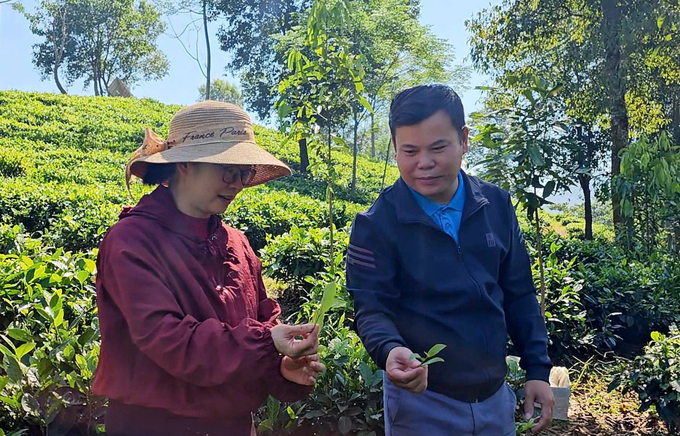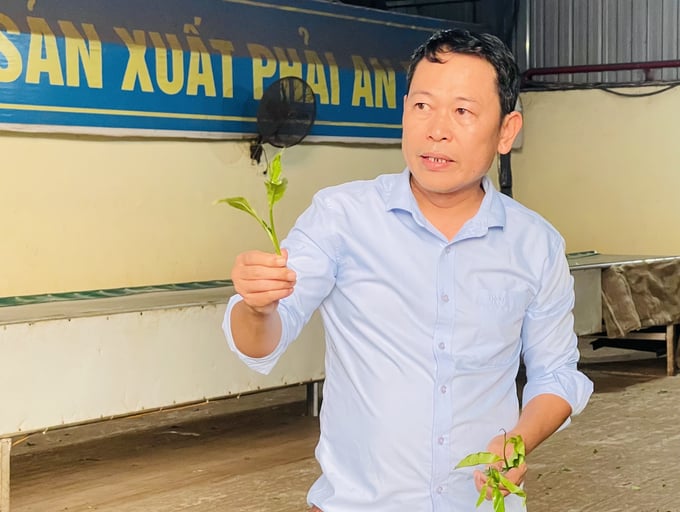May 20, 2025 | 04:10 GMT +7
May 20, 2025 | 04:10 GMT +7
Hotline: 0913.378.918
May 20, 2025 | 04:10 GMT +7
Hotline: 0913.378.918

Tea plants can survive in the climate and soil conditions of the highlands, resulting in high productivity and quality. Photo: H.D.
A state-owned tea production and processing farm has developed a tea raw material area in Lung Vai Commune, Muong Khuong District since the 1960s. After the state divested, the farm transitioned into a joint-stock company, with other entities continuing tea production locally.
With ideal conditions and local expertise in tea cultivation, residents of Lung Vai Commune made the bold decision to expand their tea farms. To date, the commune houses over 1,100 hectares of tea production area, including 940 hectares of actively harvested cultivation area. The remaining area is currently undergoing canopy development. Several local households have been able to afford luxuries and accommodations with profits from tea cultivation.
Sung Seo Pao, a resident of Coc Lay Village in Lung Vai Commune, noted that tea cultivation is an established tradition for the local farming community. With the emergence of tea traders, farmers expanded their production areas and adopted tea as their primary livelihood, replacing corn and rice.
Pao’s family currently owns the largest tea farm in the village, with a monthly fresh tea bud yield of approximately 7 tons. His family generates an estimated income of nearly 50 million VND before expenses.
Another resident of Coc Lay Village, Sung Seo Thanh, also cultivates 2 hectares of tea, earning several millions of VND in profit every month.
After each harvest, local farmers focus on tending to their tea plants and regularly spraying biological pest control agents to promote healthy growth. They are familiar with common tea pests and diseases, such as brown leafhoppers, green leafhoppers, white-backed plant hoppers, tea thrips, and leaf swelling disease. Moreover, they only use approved and permitted pesticides.
Lung Vai Commune, with its favorable transportation linkages, proximity to the National Route 4D, and expansive land space, has attracted significant investment from the business community. Today, Lung Vai tea products can be found in both domestic and international markets.
According to Vang Viet Trung, Vice Chairman of the Lung Vai Commune People’s Committee, the commune is currently exporting its tea as a raw product to the Middle East at approximately 1.4 USD per kilogram. Similarly, exports to the Taiwanese market fetch a price of approximately 2 USD per kilogram. However, Lung Vai's immediate priorities include maintaining stable production levels and supporting local farmers in preserving their cultivation areas. On the other hand, the commune's long-term goal involves developing high-quality tea products and gaining access to premium markets with stricter requirements and higher values.

By focusing on careful cultivation and harvesting practices, tea farmers can benefit from a higher income level. Photo: H.D.
According to Le Thanh Hoa, Head of Agriculture and Rural Development in Muong Khuong District, the altitude and cool climate contribute to Muong Khuong tea's exceptional quality.
Tea is a relatively low-maintenance crop that neither demands intensive cultivation processes nor advanced technical expertise, making it particularly well-suited to the education level of highland residents. With the buds and leaves as the only harvested items, productivity increases proportionately with investment in intensive farming. Conversely, farmers employing lower-intensity methods may experience reduced yields, though tea plants are more resilient and do not suffer from seasonal crop failures.
"We are coordinating with the local business community to reorganize production by forming cooperative groups and signing linkage contracts to promote product consumption through companies and cooperatives. During this process, stakeholders must strictly comply with the technical guidelines for producing safe and high-quality tea. When businesses can sell and export at higher prices, they will purchase tea from local farmers at a premium," emphasized Le Thanh Hoa.
The Muong Khuong Tea Cooperative, one of the export tea processing businesses in Lung Vai Commune, is purchasing fresh tea buds from residents across the district.
However, a representative from the cooperative noted that Muong Khuong tea is currently unable to access major markets around the world. As a result, farmers must adjust their cultivation practices, enhance harvesting techniques, and tend to their crops during winter dormancy periods to improve the quality grade of their tea.
"We have high-profile buyers; the market is currently experiencing a shortfall of nearly 5,000 tons of dried tea for export. Next year, we plan to work alongside local governments to expand raw material areas, build two additional factories to promote product consumption, and guide sustainable raw material development," said Nguyen Hoang Quan, Deputy Director of the Muong Khuong Tea Cooperative. "As the quality of fresh tea buds improves, farmers can see an increase of 15 to 20% in their income levels."
Translated by Nguyen Hai Long

(VAN) On May 15, Ministry of Agriculture and Environment of Vietnam hosted the 'Connecting Vietnam - Germany agricultural, forestry and fishery trade' seminar in Berlin, Germany.

(VAN) In the face of counterfeit and imitation products, Khanh Hoa Salanganes Nest Company hopes for the prompt completion of the legal framework, strict enforcement against violations, and protection of the bird’s nest brand.

(VAN) Japan's efforts to lower the price of rice through the release of its stockpile may finally be making some progress, albeit at a snail's pace.

(VAN) U.S. tariffs are not only a 'shock', but also an opportunity for Vietnamese businesses to renew their mindset toward comprehensive development.

(VAN) As Bac Giang lychee enters the harvest season, Minister Do Duc Duy expects that the fruit will contribute greatly to agricultural exports due to standardized production and deep processing.

(VAN) Consumers have shown a preference for free-range eggs, but those farming systems are more vulnerable to biosecurity risks like bird flu.
/2025/05/09/5701-1-184335_301.jpg)
(VAN) Vietnam’s eel exports nearly doubled thanks to a mud-free farming model, opening up new prospects while still facing numerous barriers related to international standards.